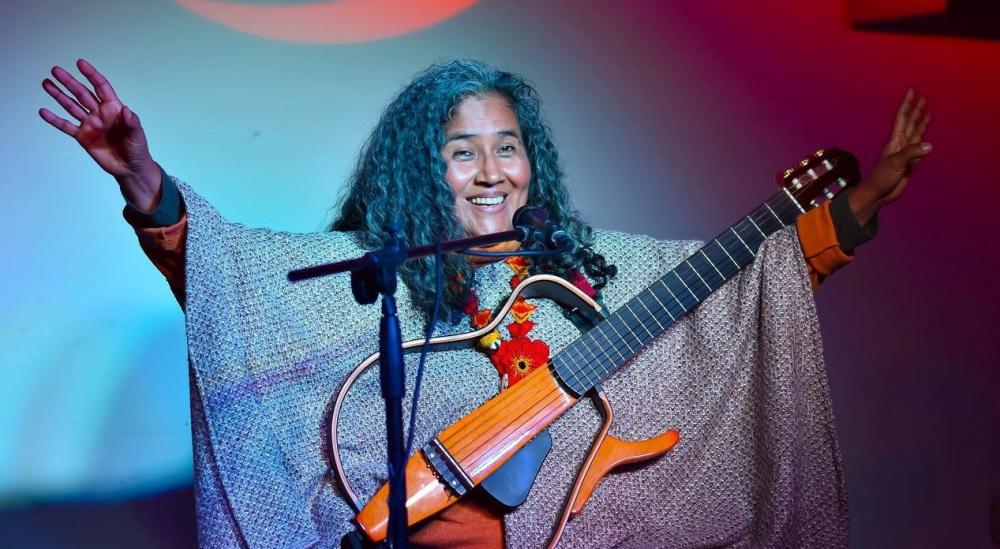Guadalupe Urbina is at home in many roles. Daughter of the proud traditions of Costa Rica’s northwestern Guanacaste province, she is folk singer and songwriter, guitarist and storyteller, researcher and representative of her culture. The internationally acclaimed artist is also peace activist, poet, painter, proud mother of two and, last but not least, woman. Her dress is a fiery orange red, her hair a black cascade of curls, her voice an expressive alto.
“I’m very conscious of being a woman – of having the privilege of this condition,” Urbina says. “The female gender enables me to see the world from another perspective. Not from the center of power, but from the periphery, where more diversity is possible.” A protagonist for life’s diversity, simplicity and peacefulness, the lively 48-year-old artist considers acts more important than words.
Whether on tour in Spain, appearing at a music festival in Canada, attending an International Women’s Day event in Holland, composing a protest song against the Central American Free-Trade Agreement with the United States (CAFTA) in Costa Rica, or writing a lecture for the San José-based Feminist International Radio Endeavor (FIRE), the multitalented Urbina fascinates with her energy and expressiveness.
Described by the international press as “Costa Rica’s voice in the concert of human rights in the world, “Urbina transforms passion into narration, poetry and song. Never losing track of the best of Latin American musical tradition, she creates a magical, sylvan world with her works. Her art surprises, moves and animates through its originality and simplicity.
“I’m a very passionate person, communicating my feelings through singing and writing,” she says. “Intuition is not magic; it’s energy. I trust my emotions and sensations more than thoughts.” Urbina was born and raised in Sardinal, a small town in northwestern Guanacaste. The daughter of Nicaraguan immigrants and youngest of 10 siblings recalls her childhood home as a place where family members gathered during the afternoon for storytelling, guitar playing and singing.
Urbina’s mother was the first to introduce her to the oral tradition of Guanacaste, its songs, rhythms and tales. By the age of 8, Urbina had such a large repertoire, learned from her mother or from local radio station broadcasts, that she became a frequent performer at family events.
By 17, she had begun to write poems, and later studied music and guitar at the National University (UNA) in Heredia, north of San José, for four years. She also took singing lessons for 18 months, but the training turned out to be a hindrance to what she really wanted.
“It was not the right thing for me,” she remembers. “I was looking for my own style – the music of my origins, my province.”
During the 1980s, Urbina gave performances of her own music, while making contact with representatives of the international women’s liberation and peace movement, who, after the Sandinista revolution in Nicaragua, were watching the political situation in Central America.
Establishing herself as a folk singer in Costa Rica was not easy, Urbina says. At the time, the commercialized popular music scene was chiefly dominated by men, she stresses, and jazz and classical music were the styles of choice.
“I did not originate from Guanacaste’s aristocracy, and to be an intelligent woman and a Costa Rican of mixed American Indian, African American and European ancestry was disadvantageous,” she recalls.
1987 marked an important turn in Urbina’s life, with the success of her participation in the Latin American Music Festival in Utrecht, Netherlands. Her performance landed her an invitation to join the 1988 concert for Amnesty International in Costa Rica, featuring Bruce Springsteen, Sting, Tracy Chapman, Peter Gabriel and Senegalese music legend Youssou N’Dour.
Presenting the traditional folklore of Costa Rica, as well as her own songs, Urbina became a recognized and successful artist, performing in Europe, Africa and all over the Americas, winning international awards for her work in oral narration and her distinctive interpretation of Costa Rican folk music. The thirst for adventure took her back to Holland, where she lived from 1996 to 2005.
Sponsored by scholarships from the Dutch government, Urbina had the opportunity to learn special singing techniques and explored the fascinating world of percussion instruments. Her experience collaborating with Dutch musicians such as violinist Koos Koopmans, guitar and saxophone player Thea van der Meer and singer Tineke Langedijk, were of great importance to her. While in Holland, Urbina produced four albums, of which “Al Menudeo” a combination of book and CD, was received with enthusiasm.
“Holland was wonderful,” she summarizes. “But I think the country was better prepared to receive me than I was ready to live there. Like the ocelot, who cannot live in the Antarctic, I had to return to my beloved Costa Rica.”
Urbina now lives in Nicoya, in the heart of the Guanacaste province, though she is a frequent guest at clubs and theaters in the Central Valley. She is preparing an interactive musical theater show called “Wings of the Butterfly,” based on the doctoral thesis of Puerto Rican-Costa Rican journalist María Suárez, co-founder of FIRE. Entitled “Women: Metamorphosis of the Butterfly Effect,” Suárez’s book features extraordinary women from the Americas, Africa, Asia and Europe, whose contributions in different disciplines have been undervalued throughout history.
Supported by a group of Costa Rican and international female advisors, the premiere of the play is scheduled for November in Costa Rica and the Netherlands. The show will also be performed in Barcelona in 2008.
Urbina, the artistic coordinator of the project, says she is delighted that so many people are already interested in it, because “the role of women in the construction of new paradigms is more important than ever.”






